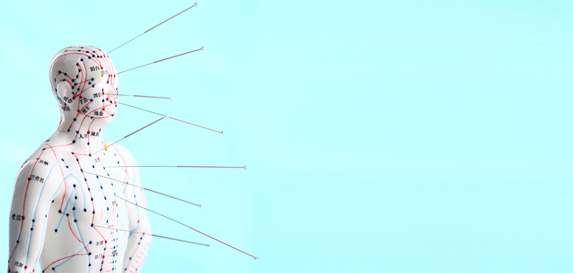
Acupuncture has proven to be an effective solution for some cancer treatment side effects, when it’s performed by a qualified acupuncturist.
Sticking needles in your skin may seem like the last thing you would want to do if you’re experiencing pain. But acupuncture, a form of traditional Chinese medicine (TCM), has proven to be an effective way to relieve aches and pains associated with cancer treatments. Acupuncture clinical trials have also shown it can strengthen the immune system during treatment and provide relief for:
- Nausea
- Vomiting
- Fatigue
- Hot Flashes
- Anxiety
- Depression
- Neuropathy
- Dry Mouth
- Sleep Problems
As a recognized pain reduction treatment, acupuncture is now covered by most insurance policies. This makes it much easier for patients to explore their integrative therapy options.
If you’re interested in trying acupuncture, the first step is to talk to your doctor about the possibility of getting treatments. Your doctor can provide insight into how beneficial acupuncture could be for your condition and symptoms.
Once you and your doctor decide acupuncture is safe to try, the next step is finding a qualified acupuncturist. There are a number of things to consider before scheduling your first acupuncture session:
- Licensing. Dr. Andrew Vickers, a research methodologist at Memorial Sloan-Kettering Cancer Center, recommends patients seeking an acupuncturist look at the individual’s state accreditation. Acupuncturists have to be licensed through the state where they are working.
- Health regulations. It’s also critical the acupuncturist stringently follows health and safety protocols. Chief among them is the use of clean needles. As the Director of the MD Anderson Cancer Center’s Integrative Medicine Program, Dr. Lorenzo Cohen is extremely knowledgeable in acupuncture best practices. He stresses anyone seeking treatment should, “Make sure acupuncture is delivered by a licensed, credentialed practitioner who uses sterile techniques and only disposable needles.” This is important for anyone, but for people with compromised immune systems it’s critical only a new set of single-use needles be used.
- Collaborative healthcare professionals. For survivors interested in pursuing TCM therapies, Dr. Cohen says the best approach is for conventional medicine and TCM doctors to collaborate to optimize treatment. If the acupuncturist isn’t on board with collaborating, move on to another therapist.
- Experience treating cancer patients. Dr. Cohen suggests it’s best to find a TCM doctor who has specific experience working with cancer patients. Ask the acupuncturist if he/she has worked with cancer survivors, and if so, ask what kind of cancer treatments the person was receiving.
- NCCAOM certification. The National Certification Commission for Acupuncture and Oriental Medicine (NCCAOM) provides national certification for acupuncture practitioners. In many states, NCCAOM certification is required. You can find a list of certified acupuncturists on the organization’s website.
For more information and advice on choosing a good acupuncturist, you can also contact the National Center for Complementary and Alternative Medicine.
